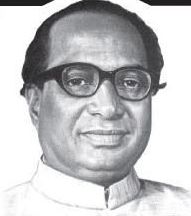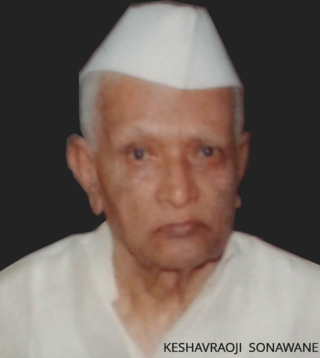
Sharadchandra Pawar is an Indian politician. He has served as the Chief Minister of Maharashtra for four terms and has also served in the Union Council Of Ministers as the Minister of Defence in the Cabinet of P.V Narsimha Rao and Minister of Agriculture in the Cabinet of Manmohan Singh. He is the first and former president of the Nationalist Congress Party (NCP), which he founded in 1999, after separating from the Indian National Congress. His NCP was split by his own nephew, Ajit Pawar. He leads the his faction NCP delegation in the Rajya Sabha, the upper chamber of the Indian parliament. He is the chairperson of Maha Vikas Aghadi, a regional Maharashtra-based political alliance.

Samyukta Maharashtra Movement, commonly known as the Samyukta Maharashtra Samiti, was an organisation in India that advocated for a separate Marathi-speaking state in Western India and Central India from 1956 to 1960.

Yashwantrao Balwantrao Chavan was an Indian freedom fighter and politician. He served as the last Chief Minister of Bombay State and the first of Maharashtra after latter was created by the division of Bombay state. His last significant ministerial post was as the Deputy Prime Minister of India in the short lived Charan Singh government in 1979.

Jayant Rajaram Patil is an Indian politician from the state of Maharashtra. He has been representing Islampur in the Maharashtra Legislative Assembly for more than 3 decades. He was the Cabinet Minister of the Water Resources Department in Uddhav Thackeray ministry. Previously he has been the Rural Development Minister, the Finance Minister and the Home Minister of Maharashtra.

Prithviraj Chavan is an Indian politician who was the 17th Chief Minister of Maharashtra from 2010 to 2014. Chavan is a graduate of BITS Pilani and University of California, Berkeley in mechanical engineering. He spent time working in the field of aircraft instrumentation and designing audio recorders for anti-submarine warfare in the US before returning to India and becoming an entrepreneur in 1974. Referred to in the media as a technocrat with a clean, non-controversial image, a low-profile leader. Chavan served as the Minister of State in the Prime Minister's Office in the Ministry of Parliamentary Affairs and Ministry of Personnel, Public Grievances, and Pensions. Chavan was also General Secretary of the All-India Congress Committee (AICC), in-charge of many states, including Jammu and Kashmir, Karnataka, Haryana, Gujarat, Tripura, and Arunachal Pradesh.

Gulabrao Raghunathrao Patil was a Renowned Co-operative Leader, Member of Parliament (MP)-Rajya Sabha India, Maharashtra State Sangli from 1966 to 1978,Member of the Legislative Council (MLC) of Maharashtra 1983−87 and president of Maharashtra Pradesh Congress(I) Committee 1981−82. Patil also served as chairman of Maharashtra State Co-operative Bank in Mumbai from 1980 to 1982, chairman of Sangli District Cooperative Bank Sangli and Secretary of National Co-operative Union of India (NCUI), New Delhi. Gulabrao Patil was regarded as a Maratha Strongman in Maharashtra politics in the 1970s and 1980s. Year 2020–2021 is going to celebrate as Birth Centenary Year of Late. Gulabrao Patil (1921–2021)

Ashok Shankarrao Chavan is an Indian politician from Maharashtra. He is son of ex-Maharashtra Chief Minister Shankarrao Chavan. He was one of the most influential leaders of Indian National Congress in Maharashtra but later resigned and joined Bhartiya Janata Party on 13 Feb 2024. He has served as the Chief Minister of Maharashtra state from 8 December 2008 to 9 November 2010. Also, he has served as Minister for Cultural Affairs, Industries, Mines and Protocol in the Vilasrao Deshmukh government and he is also the former PWD Minister of Maharashtra.
Keshavrao Marutirao Jedhe (Deshmukh) (21 April 1896 – 12 November 1959) also known as Keshavrao Jedhe was an Indian independence activist and politician from Pune. He served as a leading figure in the Indian National Congress, and in the Samyukta Maharashtra movement during the independence. The famous Swargate chowk in Pune is named after him.

Bhikajirao Jijaba Khatal-Patil, popularly known as Dada or Khatal Saheb was an Indian politician. He was a senior Maharashtra leader and a veteran Congressman. He served as a member of the Legislative Assembly of Maharashtra for over 20 years, also holding various Cabinet ministries in the Maharashtra Government. He represented the Sangamner constituency of Maharashtra and was a member of the Indian National Congress (INC) political party. In 1985 he retired from politics. He was elected to the Maharashtra Vidhan Sabha from Sangamner during 1962, 1967, 1972 and 1980 elections.
Although a parliamentary democracy, Indian politics has increasingly become dynastic, possibly due to the absence of a party organization, independent civil society associations that mobilize support for the party, and centralized financing of elections. Family members have also led the Congress party for most of the period since 1978 when Indira Gandhi floated the then Congress(I) faction of the party. It also is fairly common in many political parties in Maharashtra. The dynastic phenomenon is seen from national level down to district level and even village level.The three-tier structure of Panchayati Raj established in the 1960s also helped to create and consolidate the dynastic phenomenon in rural areas. Apart from government,political families also control cooperative institutions, mainly cooperative sugar factories,district cooperative banks in the state, and since the 1980s private for profit colleges. The ruling Bharatiya Janata Party also features several senior leaders who are dynasts. In Maharashtra, the NCP has particularly high level of dynasticism.

Keshavrao Sonawane (1925–2006) was an Indian politician, who served four terms in the Maharashtra Legislative Assembly, and was a Co-operative minister in Yashwantrao Chavan's cabinet and later Vasantrao Naik's cabinet during 1962–1967. He was elected as Member of Maharashtra Legislative Assembly for 4 times, twice from Latur constituency and twice from Ausa constituency.

Eknath Sambhaji Shinde is an Indian politician who is serving as the 20th and current Chief Minister of Maharashtra since 30 June 2022. He is also serving as the Leader of Shiv Sena since February 2023 and the Leader of the House, Maharashtra Legislative Assembly since July 2022. He is also the Member of Legislative Assembly for the Kopri-Pachpakhadi constituency of Thane, Maharashtra since 2009 and was formerly the MLA of Thane constituency from 2004 to 2009.
Ashok Chavan was sworn in as Chief Minister of Maharashtra for the first time in 2008, after his predecessor, Vilasrao Deshmukh resigned the office in the aftermath of 2008 Mumbai terrorist attacks. The first Chavan ministry governed until the 2009 Maharashtra Legislative Assembly election, which resulted in a victory for Chavan-led Congress-NCP alliance and Chavan forming his second ministry.
Shankarrao Chavan was sworn in as Chief Minister of Maharashtra for the second time in March 1986, on resignation of his predecessor, Shivajirao Patil Nilangekar. Chavan's cabinet served until his resignation on 26 June 1988, and subsequent replacement by Sharad Pawar's ministry.
B. G. Kher became the prime minister of Bombay Presidency for the second time on 3 April 1946. He had previously served in the office from 1937 to 1939. On account of Second World War, the premiership was vacant from 1939 to 1946. Kher continued till Indian Independence on 15 August 1947, after which, the office was abolished and Kher succeeded himself as the chief minister of Bombay State.
Shankarrao Chavan was appointed as Chief Minister of Maharashtra for the first time on 21 February 1975, replacing Vasantrao Naik. His first ministry lasted till 16 April 1977, and was succeeded by Vasantdada Patil's ministry.
Following 1972 Maharashtra Legislative Assembly election, incumbent chief minister Vasantrao Naik was re-appointed, and he formed his third government on 14 March 1972. This was to be Naik's last government which served until 20 February 1975.
Marotrao Kannamwar became the chief minister of Maharashtra on 20 November 1962. He succeeded Yashwantrao Chavan, who had been appointed defence minister of India by Jawaharlal Nehru. Kannamwar had previously been buildings and communications minister in Chavan's cabinet.
Yashwantrao Chavan was the chief minister of Bombay State until its bifurcation into Maharashtra and Gujarat on 1 May 1960. Chavan became the first chief minister of Maharashtra from that day. His government continued till 1962 legislative elections, after which Chavan was sworn in for a second term.










